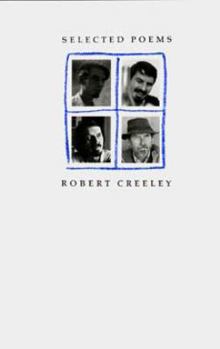Selected Poems of Robert Creeley
Select Format
Select Condition 
Book Overview
Here, in a new selection of 200 poems from five decades, is the distinctive voice of Robert Creeley, reminding us of what has made him one of the most important and affectionately regarded poets of our time.
Format:Paperback
Language:English
ISBN:0520069366
ISBN13:9780520069367
Release Date:March 1996
Publisher:University of California Press
Length:366 Pages
Weight:0.89 lbs.
Dimensions:0.8" x 5.0" x 8.0"
Customer Reviews
3 ratings
The gentle giant
Published by Thriftbooks.com User , 15 years ago
Although there are some, the adjectives are still few and far in between in Olson's verse. Remembering that the poet was a towering colossus of a man, the absence of such qualifiers seems like a purposeful holding back, a toning down of voice and volume to keep us unafraid. The short length of the lines may serve the same purpose, as does the sprinkling of indented stanzas, or the unfinished parentheticals, and other forms of play to alleviate the weight of heavy subjects. A towering colossus not only in physique, but truly one of the greats. There is out there in cyberspace a video clip of the poet in which, responding to an unknown comment, he says something like: "We need neither Vulcan nor Apollo, we need them like a hole in the head... [Pause]... We need only heaven and earth."
Charles Olson: "finding out for himself"
Published by Thriftbooks.com User , 23 years ago
"History was "'istorin," which Olson took from Herodotus and used not as a noun or concept, but, rather, as a verb, "to find out for yourself." ---Robert Creeley, from his preface. Charles Olson is a poet of poignant searching. Throughout this volume, confidently compiled by Olson's longtime friend and correspondent, Robert Creeley, Olson seems to be finding out for himself what it is to be human. In the soliloquy poem, "Maximus, to himself" (taken from Olson's magnum opus, The Maximus Poems), Olson shows that this process involves the discussion of feelings of inadequacy. He describes the frustration of "[standing] estranged / from that which was most familiar," when "the sharpness (the achiote) / I note in others, / makes more sense / than my own distances." Here, Olson seems to want to attain a certain quickness of mind which he sees as an essential human characteristic. The qualities he admires in others are mixed, though, as when he says of Sappho (in "For Sappho, Back"): "with a bold / she looked on any man, / with a shy eye." Her power seems to come in her duality, her ability to appear both "bold" and "shy." This discussion of Sappho shows that Olson is concerned with the classical world, but he can also be an achingly banal poet as when, in "As the Dead Pray Upon Us," he remembers his dead mother, saying, "And if she sits in happiness the souls / who trouble her and me / will also rest. The automobile // has been hauled away." A truly great poet, Olson realized that the real history is that of the self, in all its foibles, contradictions, and blisses.
Essential, a quick look at a true genius
Published by Thriftbooks.com User , 26 years ago
Charles Olson (1910-1970) was one of the most important American poets of the 20th Century. In this volume, Olson friend Robert Creeley has chosen most of the poems that I would have chosen for such a volume. He has included such works as "An Ode on Nativity" and "The Twist" which help celebrate the city of his birth and youth, Worcester MA. Creeley fairly evenly divides the book between choosing from The Collected Poems and The Maximus Poems. The only poem that is not in this excellent volume that I would have included is "Ferrini 1," Olson's tribute to his brilliant friend, Vincent Ferrini. Buy this book!





